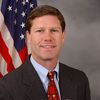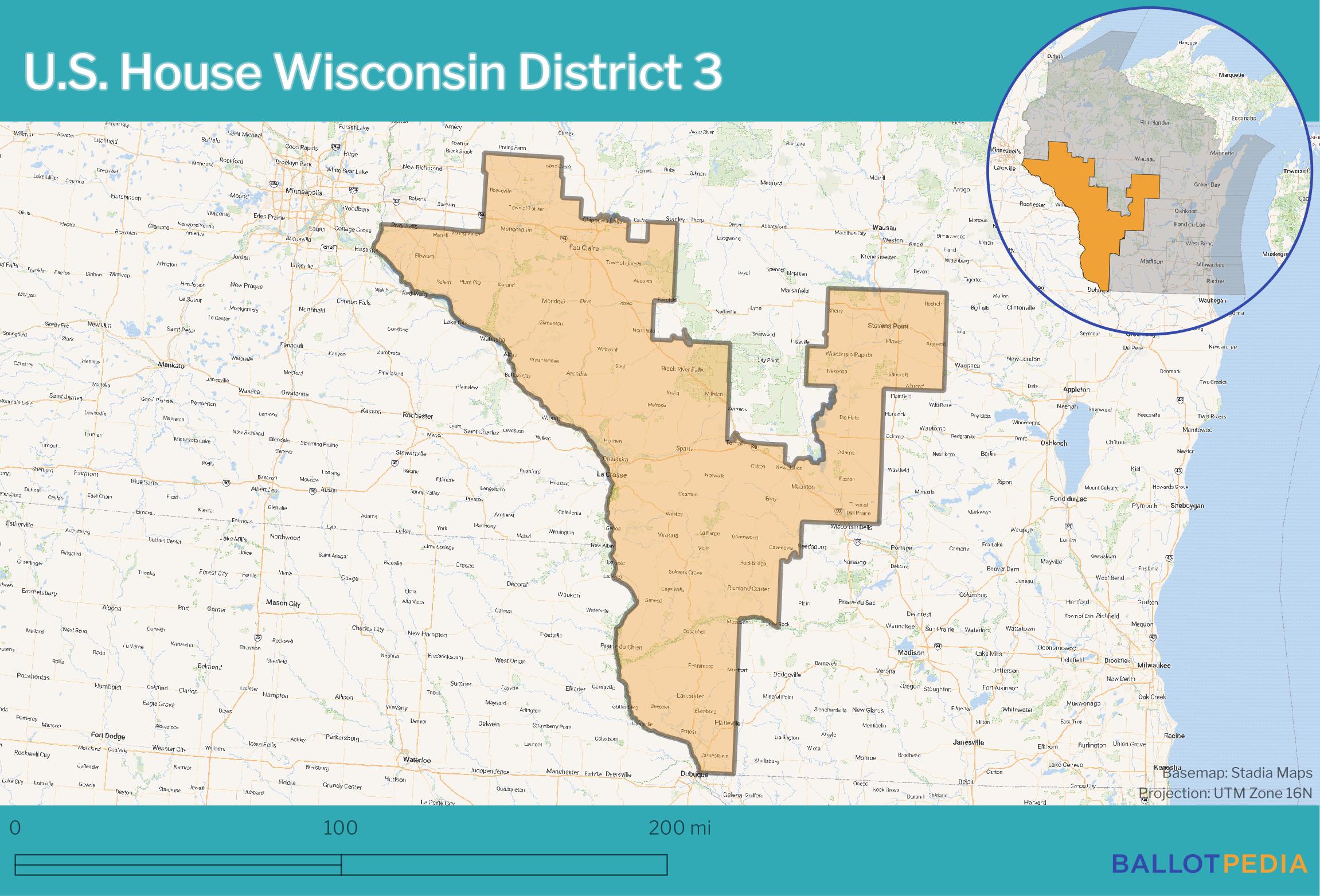Wisconsin's 3rd Congressional District election, 2026
|
← 2024
|
| Wisconsin's 3rd Congressional District |
|---|
| Democratic primary Republican primary General election |
| Election details |
| Filing deadline: June 1, 2026 |
| Primary: August 11, 2026 General: November 3, 2026 |
| How to vote |
| Poll times:
7 a.m. to 8 p.m. |
| Race ratings |
DDHQ and The Hill: Pending Inside Elections: Tilt Republican Sabato's Crystal Ball: Toss-up |
| Ballotpedia analysis |
| U.S. Senate battlegrounds U.S. House battlegrounds Federal and state primary competitiveness Ballotpedia's Election Analysis Hub, 2026 |
| See also |
1st • 2nd • 3rd • 4th • 5th • 6th • 7th • 8th Wisconsin elections, 2026 U.S. Congress elections, 2026 U.S. Senate elections, 2026 U.S. House elections, 2026 |
All U.S. House districts, including the 3rd Congressional District of Wisconsin, are holding elections in 2026. The general election is November 3, 2026. The primary is August 11, 2026. The filing deadline is June 1, 2026. For more information about the primaries in this election, click on the links below:
- Wisconsin's 3rd Congressional District election, 2026 (August 11 Democratic primary)
- Wisconsin's 3rd Congressional District election, 2026 (August 11 Republican primary)
Candidates and election results
Note: The following list includes official candidates only. Ballotpedia defines official candidates as people who:
- Register with a federal or state campaign finance agency before the candidate filing deadline
- Appear on candidate lists released by government election agencies
General election
The primary will occur on August 11, 2026. The general election will occur on November 3, 2026. Additional general election candidates will be added here following the primary.
General election for U.S. House Wisconsin District 3
Rustin Provance and Jayte Welch are running in the general election for U.S. House Wisconsin District 3 on November 3, 2026.
Candidate | ||
 | Rustin Provance (Independent) | |
| Jayte Welch (Independent) | ||
 = candidate completed the Ballotpedia Candidate Connection survey. = candidate completed the Ballotpedia Candidate Connection survey. | ||||
| If you are a candidate and would like to tell readers and voters more about why they should vote for you, complete the Ballotpedia Candidate Connection Survey. | ||||
Do you want a spreadsheet of this type of data? Contact our sales team. | ||||
Democratic primary election
Democratic primary for U.S. House Wisconsin District 3
Emily Berge, Rebecca Cooke, and Rodney Rave are running in the Democratic primary for U.S. House Wisconsin District 3 on August 11, 2026.
Candidate | ||
 | Emily Berge  | |
 | Rebecca Cooke  | |
| Rodney Rave | ||
 = candidate completed the Ballotpedia Candidate Connection survey. = candidate completed the Ballotpedia Candidate Connection survey. | ||||
| If you are a candidate and would like to tell readers and voters more about why they should vote for you, complete the Ballotpedia Candidate Connection Survey. | ||||
Do you want a spreadsheet of this type of data? Contact our sales team. | ||||
Withdrawn or disqualified candidates
- Laura Benjamin (D)
Republican primary election
Republican primary for U.S. House Wisconsin District 3
Incumbent Derrick Van Orden is running in the Republican primary for U.S. House Wisconsin District 3 on August 11, 2026.
Candidate | ||
 | Derrick Van Orden | |
 = candidate completed the Ballotpedia Candidate Connection survey. = candidate completed the Ballotpedia Candidate Connection survey. | ||||
| If you are a candidate and would like to tell readers and voters more about why they should vote for you, complete the Ballotpedia Candidate Connection Survey. | ||||
Do you want a spreadsheet of this type of data? Contact our sales team. | ||||
Candidate profiles
There are currently no candidate profiles created for this race. Candidate profiles will appear here as they are created. Encourage the candidates in this race to complete Ballotpedia's Candidate Connection survey so that their profile will appear here. You can ask candidates in this race to fill out the survey by clicking their names below:
Voting information
- See also: Voting in Wisconsin
Ballotpedia will publish the dates and deadlines related to this election as they are made available.
Ballotpedia's Candidate Connection survey responses

Ballotpedia asks all federal, state, and local candidates to complete a survey and share what motivates them on political and personal levels. Candidates are asked three required questions for this survey, but they may answer additional optional questions as well.
No candidate in this race has completed Ballotpedia's Candidate Connection survey. Ballotpedia is seeking 100 percent participation so voters can learn more about all the candidates on their ballots.
You can ask candidates in this race to fill out the survey by clicking their names below:
Campaign finance
| Name | Party | Receipts* | Disbursements** | Cash on hand | Date |
|---|---|---|---|---|---|
| Derrick Van Orden | Republican Party | $4,348,058 | $2,130,138 | $2,734,726 | As of December 31, 2025 |
| Emily Berge | Democratic Party | $388,856 | $319,047 | $69,808 | As of December 31, 2025 |
| Rebecca Cooke | Democratic Party | $4,065,499 | $1,525,774 | $2,549,864 | As of December 31, 2025 |
| Rodney Rave | Democratic Party | $0 | $0 | $0 | Data not available*** |
| Rustin Provance | Independent | $0 | $0 | $0 | Data not available*** |
| Jayte Welch | Independent | $0 | $0 | $0 | Data not available*** |
|
Source: Federal Elections Commission, "Campaign finance data," 2026. This product uses the openFEC API but is not endorsed or certified by the Federal Election Commission (FEC).
* According to the FEC, "Receipts are anything of value (money, goods, services or property) received by a political committee." |
|||||
General election race ratings
- See also: Race rating definitions and methods
Ballotpedia provides race ratings from four outlets: The Cook Political Report, Inside Elections, Sabato's Crystal Ball, and DDHQ/The Hill. Each race rating indicates if one party is perceived to have an advantage in the race and, if so, the degree of advantage:
- Safe and Solid ratings indicate that one party has a clear edge and the race is not competitive.
- Likely ratings indicate that one party has a clear edge, but an upset is possible.
- Lean ratings indicate that one party has a small edge, but the race is competitive.[1]
- Toss-up ratings indicate that neither party has an advantage.
Race ratings are informed by a number of factors, including polling, candidate quality, and election result history in the race's district or state.[2][3][4]
| Race ratings: Wisconsin's 3rd Congressional District election, 2026 | |||||||||
|---|---|---|---|---|---|---|---|---|---|
| Race tracker | Race ratings | ||||||||
| 2/17/2026 | 2/10/2026 | 2/3/2026 | 1/27/2026 | ||||||
| The Cook Political Report with Amy Walter | Toss-up | Toss-up | Toss-up | Toss-up | |||||
| Decision Desk HQ and The Hill | Pending | Pending | Pending | Pending | |||||
| Inside Elections with Nathan L. Gonzales | Tilt Republican | Tilt Republican | Tilt Republican | Tilt Republican | |||||
| Larry J. Sabato's Crystal Ball | Toss-up | Toss-up | Toss-up | Toss-up | |||||
| Note: Ballotpedia reviews external race ratings every week throughout the election season and posts weekly updates even if the media outlets have not revised their ratings during that week. | |||||||||
Ballot access
The table below details filing requirements for U.S. House candidates in Wisconsin in the 2026 election cycle. For additional information on candidate ballot access requirements in Wisconsin, click here.
| Filing requirements for U.S. House candidates, 2026 | ||||||
|---|---|---|---|---|---|---|
| State | Office | Party | Signatures required | Filing fee | Filing deadline | Source |
| Wisconsin | U.S. House | All candidates | 1,000 | N/A | 6/1/2026 | Source |
District history
The section below details election results for this office in elections dating back to 2020.
General election
General election for U.S. House Wisconsin District 3
Incumbent Derrick Van Orden (R) defeated Rebecca Cooke (D) in the general election for U.S. House Wisconsin District 3 on November 5, 2024.
Candidate | % | Votes | ||
| ✔ |  | Derrick Van Orden (R) | 51.3 | 212,064 |
 | Rebecca Cooke (D)  | 48.6 | 200,808 | |
| Other/Write-in votes | 0.1% | 309 | ||
| Total votes: 413,181 | ||||
 = candidate completed the Ballotpedia Candidate Connection survey. = candidate completed the Ballotpedia Candidate Connection survey. | ||||
| If you are a candidate and would like to tell readers and voters more about why they should vote for you, complete the Ballotpedia Candidate Connection Survey. | ||||
Do you want a spreadsheet of this type of data? Contact our sales team. | ||||
Withdrawn or disqualified candidates
- Rustin Provance (Independent)
Democratic primary
Democratic primary for U.S. House Wisconsin District 3
Rebecca Cooke (D) defeated Katrina Shankland (D) and Eric Wilson (D) in the Democratic primary for U.S. House Wisconsin District 3 on August 13, 2024.
Candidate | % | Votes | ||
| ✔ |  | Rebecca Cooke  | 50.5 | 42,316 |
 | Katrina Shankland  | 41.6 | 34,812 | |
 | Eric Wilson  | 7.9 | 6,624 | |
| Other/Write-in votes | 0.0% | 24 | ||
| Total votes: 83,776 | ||||
 = candidate completed the Ballotpedia Candidate Connection survey. = candidate completed the Ballotpedia Candidate Connection survey. | ||||
| If you are a candidate and would like to tell readers and voters more about why they should vote for you, complete the Ballotpedia Candidate Connection Survey. | ||||
Do you want a spreadsheet of this type of data? Contact our sales team. | ||||
Withdrawn or disqualified candidates
- Tara Johnson (D)
- Aaron Nytes (D)
Republican primary
Republican primary for U.S. House Wisconsin District 3
Incumbent Derrick Van Orden (R) advanced from the Republican primary for U.S. House Wisconsin District 3 on August 13, 2024.
Candidate | % | Votes | ||
| ✔ |  | Derrick Van Orden | 99.6 | 52,533 |
| Other/Write-in votes | 0.4% | 211 | ||
| Total votes: 52,744 | ||||
 = candidate completed the Ballotpedia Candidate Connection survey. = candidate completed the Ballotpedia Candidate Connection survey. | ||||
| If you are a candidate and would like to tell readers and voters more about why they should vote for you, complete the Ballotpedia Candidate Connection Survey. | ||||
Do you want a spreadsheet of this type of data? Contact our sales team. | ||||
General election
General election for U.S. House Wisconsin District 3
Derrick Van Orden (R) defeated Brad Pfaff (D) in the general election for U.S. House Wisconsin District 3 on November 8, 2022.
Candidate | % | Votes | ||
| ✔ |  | Derrick Van Orden (R) | 51.8 | 164,743 |
 | Brad Pfaff (D) | 48.1 | 152,977 | |
| Other/Write-in votes | 0.1% | 202 | ||
| Total votes: 317,922 | ||||
 = candidate completed the Ballotpedia Candidate Connection survey. = candidate completed the Ballotpedia Candidate Connection survey. | ||||
| If you are a candidate and would like to tell readers and voters more about why they should vote for you, complete the Ballotpedia Candidate Connection Survey. | ||||
Do you want a spreadsheet of this type of data? Contact our sales team. | ||||
Withdrawn or disqualified candidates
- Rustin Provance (L)
Democratic primary
Democratic primary for U.S. House Wisconsin District 3
Brad Pfaff (D) defeated Rebecca Cooke (D), Deb McGrath (D), and Mark A. Neumann (D) in the Democratic primary for U.S. House Wisconsin District 3 on August 9, 2022.
Candidate | % | Votes | ||
| ✔ |  | Brad Pfaff | 38.9 | 24,041 |
 | Rebecca Cooke  | 31.1 | 19,221 | |
 | Deb McGrath  | 19.1 | 11,770 | |
 | Mark A. Neumann  | 10.8 | 6,672 | |
| Other/Write-in votes | 0.0% | 25 | ||
| Total votes: 61,729 | ||||
 = candidate completed the Ballotpedia Candidate Connection survey. = candidate completed the Ballotpedia Candidate Connection survey. | ||||
| If you are a candidate and would like to tell readers and voters more about why they should vote for you, complete the Ballotpedia Candidate Connection Survey. | ||||
Do you want a spreadsheet of this type of data? Contact our sales team. | ||||
Withdrawn or disqualified candidates
- Justin Bradley (D)
- Brett Knudsen (D)
Republican primary
Republican primary for U.S. House Wisconsin District 3
Derrick Van Orden (R) advanced from the Republican primary for U.S. House Wisconsin District 3 on August 9, 2022.
Candidate | % | Votes | ||
| ✔ |  | Derrick Van Orden | 99.3 | 65,164 |
| Other/Write-in votes | 0.7% | 471 | ||
| Total votes: 65,635 | ||||
 = candidate completed the Ballotpedia Candidate Connection survey. = candidate completed the Ballotpedia Candidate Connection survey. | ||||
| If you are a candidate and would like to tell readers and voters more about why they should vote for you, complete the Ballotpedia Candidate Connection Survey. | ||||
Do you want a spreadsheet of this type of data? Contact our sales team. | ||||
Withdrawn or disqualified candidates
- Denise Hurless (R)
General election
General election for U.S. House Wisconsin District 3
Incumbent Ronald James Kind (D) defeated Derrick Van Orden (R) in the general election for U.S. House Wisconsin District 3 on November 3, 2020.
Candidate | % | Votes | ||
| ✔ |  | Ronald James Kind (D) | 51.3 | 199,870 |
 | Derrick Van Orden (R)  | 48.6 | 189,524 | |
| Other/Write-in votes | 0.1% | 224 | ||
| Total votes: 389,618 | ||||
 = candidate completed the Ballotpedia Candidate Connection survey. = candidate completed the Ballotpedia Candidate Connection survey. | ||||
| If you are a candidate and would like to tell readers and voters more about why they should vote for you, complete the Ballotpedia Candidate Connection Survey. | ||||
Do you want a spreadsheet of this type of data? Contact our sales team. | ||||
Democratic primary
Democratic primary for U.S. House Wisconsin District 3
Incumbent Ronald James Kind (D) defeated Mark A. Neumann (D) in the Democratic primary for U.S. House Wisconsin District 3 on August 11, 2020.
Candidate | % | Votes | ||
| ✔ |  | Ronald James Kind | 80.6 | 53,064 |
 | Mark A. Neumann | 19.4 | 12,765 | |
| Other/Write-in votes | 0.0% | 12 | ||
| Total votes: 65,841 | ||||
 = candidate completed the Ballotpedia Candidate Connection survey. = candidate completed the Ballotpedia Candidate Connection survey. | ||||
| If you are a candidate and would like to tell readers and voters more about why they should vote for you, complete the Ballotpedia Candidate Connection Survey. | ||||
Do you want a spreadsheet of this type of data? Contact our sales team. | ||||
Withdrawn or disqualified candidates
- Justin Bonner (D)
Republican primary
Republican primary for U.S. House Wisconsin District 3
Derrick Van Orden (R) defeated Jessi Ebben (R) in the Republican primary for U.S. House Wisconsin District 3 on August 11, 2020.
Candidate | % | Votes | ||
| ✔ |  | Derrick Van Orden  | 65.9 | 36,395 |
 | Jessi Ebben  | 34.1 | 18,835 | |
| Other/Write-in votes | 0.0% | 21 | ||
| Total votes: 55,251 | ||||
 = candidate completed the Ballotpedia Candidate Connection survey. = candidate completed the Ballotpedia Candidate Connection survey. | ||||
| If you are a candidate and would like to tell readers and voters more about why they should vote for you, complete the Ballotpedia Candidate Connection Survey. | ||||
Do you want a spreadsheet of this type of data? Contact our sales team. | ||||
Withdrawn or disqualified candidates
- Brandon Cook (R)
- John Garske (R)
- Shannon Moats (R)
- Tim Peters (R)
- Kevin Ruscher (R)
- Jonathan Sundblom (R)
- Alex Virijevich (R)
District analysis
Click the tabs below to view information about voter composition, past elections, and demographics in both the district and the state.
- District map - A map of the district in place for the election.
- Competitiveness - Information about the competitiveness of 2026 U.S. House elections in the state.
- Presidential elections - Information about presidential elections in the district and the state.
- State party control - The partisan makeup of the state's congressional delegation and state government.
Below is the district map in place for this election. Click the map below to enlarge it.

Partisan Voter Index
Heading into the 2026 elections, based on results from the 2024 and 2020 presidential elections, the Cook Partisan Voter Index for this district is R+3. This meant that in those two presidential elections, this district's results were 3 percentage points more Republican than the national average. This made Wisconsin's 3rd the 200th most Republican district nationally.[5]
2020 presidential election results
The table below shows what the vote in the 2024 presidential election was in this district. The presidential election data was compiled by The Downballot.
| Kamala Harris | Donald Trump |
|---|---|
| 46.0% | 53.0% |
Presidential voting history
- See also: Presidential election in Wisconsin, 2024
Wisconsin presidential election results (1900-2024)
- 15 Democratic wins
- 16 Republican wins
- 1 other win
| Year | 1900 | 1904 | 1908 | 1912 | 1916 | 1920 | 1924 | 1928 | 1932 | 1936 | 1940 | 1944 | 1948 | 1952 | 1956 | 1960 | 1964 | 1968 | 1972 | 1976 | 1980 | 1984 | 1988 | 1992 | 1996 | 2000 | 2004 | 2008 | 2012 | 2016 | 2020 | 2024 |
|---|---|---|---|---|---|---|---|---|---|---|---|---|---|---|---|---|---|---|---|---|---|---|---|---|---|---|---|---|---|---|---|---|
| Winning Party | R | R | R | D | R | R | P[6] | R | D | D | D | R | D | R | R | R | D | R | R | D | R | R | D | D | D | D | D | D | D | R | D | R |
Congressional delegation
The table below displays the partisan composition of Wisconsin's congressional delegation as of October 2025.
| Congressional Partisan Breakdown from Wisconsin | |||
|---|---|---|---|
| Party | U.S. Senate | U.S. House | Total |
| Democratic | 1 | 2 | 3 |
| Republican | 1 | 6 | 7 |
| Independent | 0 | 0 | 0 |
| Vacancies | 0 | 0 | 0 |
| Total | 2 | 8 | 10 |
State executive
The table below displays the officeholders in Wisconsin's top four state executive offices as of October 2025.
| Office | Officeholder |
|---|---|
| Governor | |
| Lieutenant Governor | |
| Secretary of State | |
| Attorney General |
State legislature
Wisconsin State Senate
| Party | As of October 2025 | |
|---|---|---|
| Democratic Party | 15 | |
| Republican Party | 18 | |
| Other | 0 | |
| Vacancies | 0 | |
| Total | 33 | |
Wisconsin State Assembly
| Party | As of October 2025 | |
|---|---|---|
| Democratic Party | 45 | |
| Republican Party | 54 | |
| Other | 0 | |
| Vacancies | 0 | |
| Total | 99 | |
Trifecta control
Wisconsin Party Control: 1992-2025
Two years of Democratic trifectas • Ten years of Republican trifectas
Scroll left and right on the table below to view more years.
| Year | 92 | 93 | 94 | 95 | 96 | 97 | 98 | 99 | 00 | 01 | 02 | 03 | 04 | 05 | 06 | 07 | 08 | 09 | 10 | 11 | 12 | 13 | 14 | 15 | 16 | 17 | 18 | 19 | 20 | 21 | 22 | 23 | 24 | 25 |
|---|---|---|---|---|---|---|---|---|---|---|---|---|---|---|---|---|---|---|---|---|---|---|---|---|---|---|---|---|---|---|---|---|---|---|
| Governor | R | R | R | R | R | R | R | R | R | R | R | D | D | D | D | D | D | D | D | R | R | R | R | R | R | R | R | D | D | D | D | D | D | D |
| Senate | D | R | R | R | D | D | R | D | D | D | D | R | R | R | R | D | D | D | D | R | R | R | R | R | R | R | R | R | R | R | R | R | R | R |
| House | D | D | D | R | R | R | R | R | R | R | R | R | R | R | R | R | R | D | D | R | R | R | R | R | R | R | R | R | R | R | R | R | R | R |
See also
External links
Footnotes
- ↑ Inside Elections also uses Tilt ratings to indicate an even smaller advantage and greater competitiveness.
- ↑ Amee LaTour, "Email correspondence with Nathan Gonzalez," April 19, 2018
- ↑ Amee LaTour, "Email correspondence with Kyle Kondik," April 19, 2018
- ↑ Amee LaTour, "Email correspondence with Charlie Cook," April 22, 2018
- ↑ Cook Political Report, "2025 Cook PVI℠: District Map and List (119th Congress)," accessed July 1, 2025
- ↑ Progressive Party








